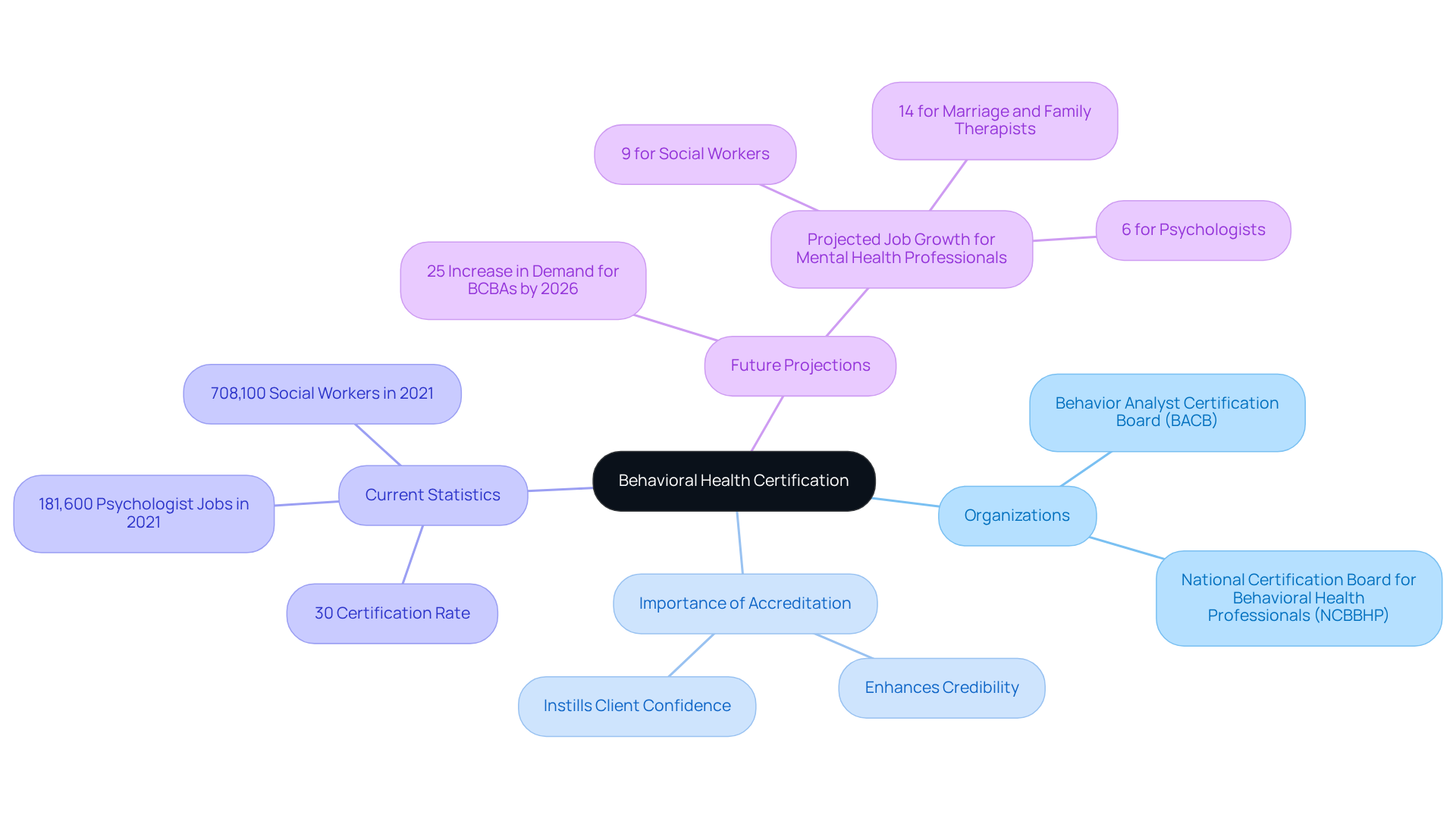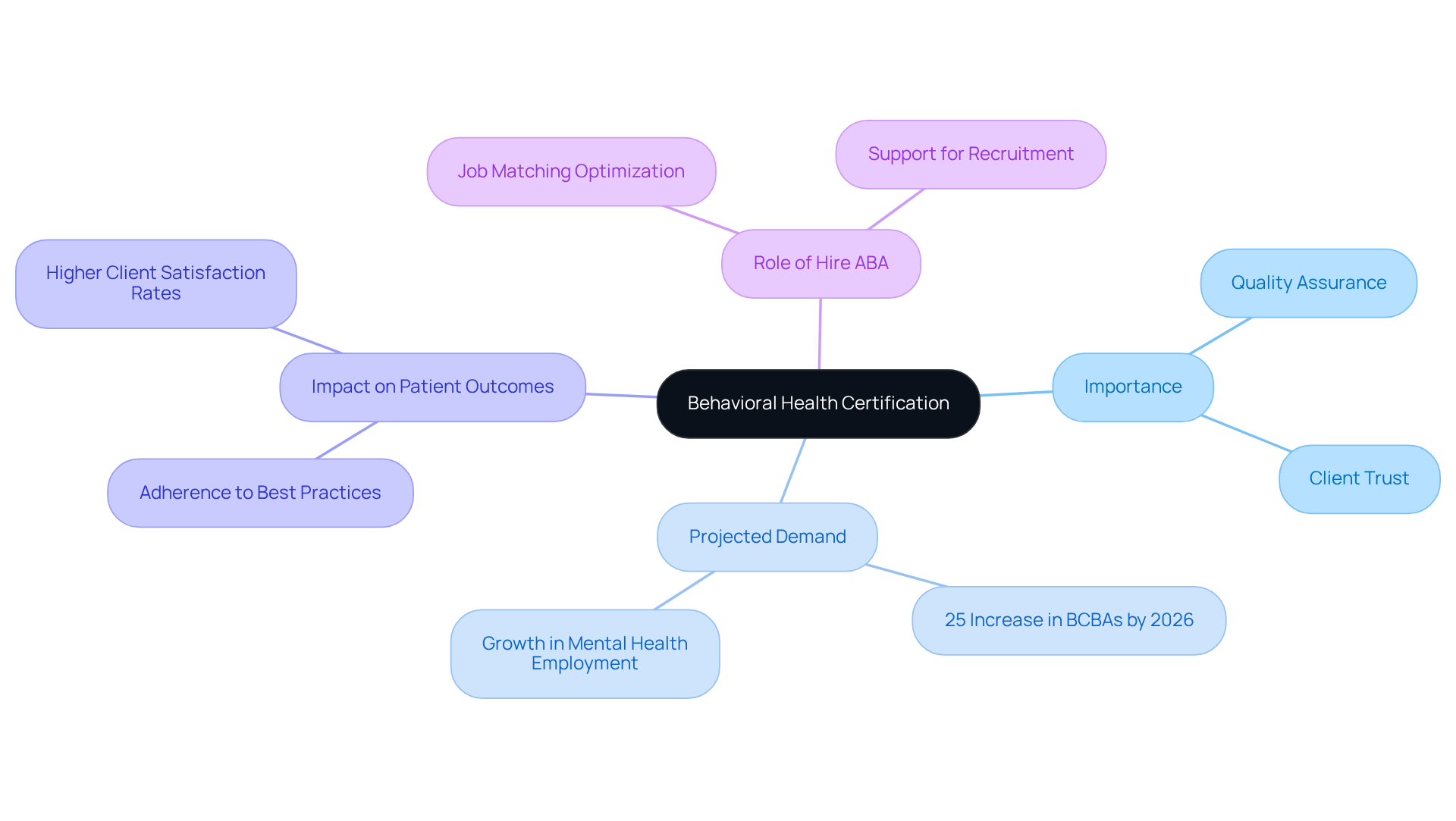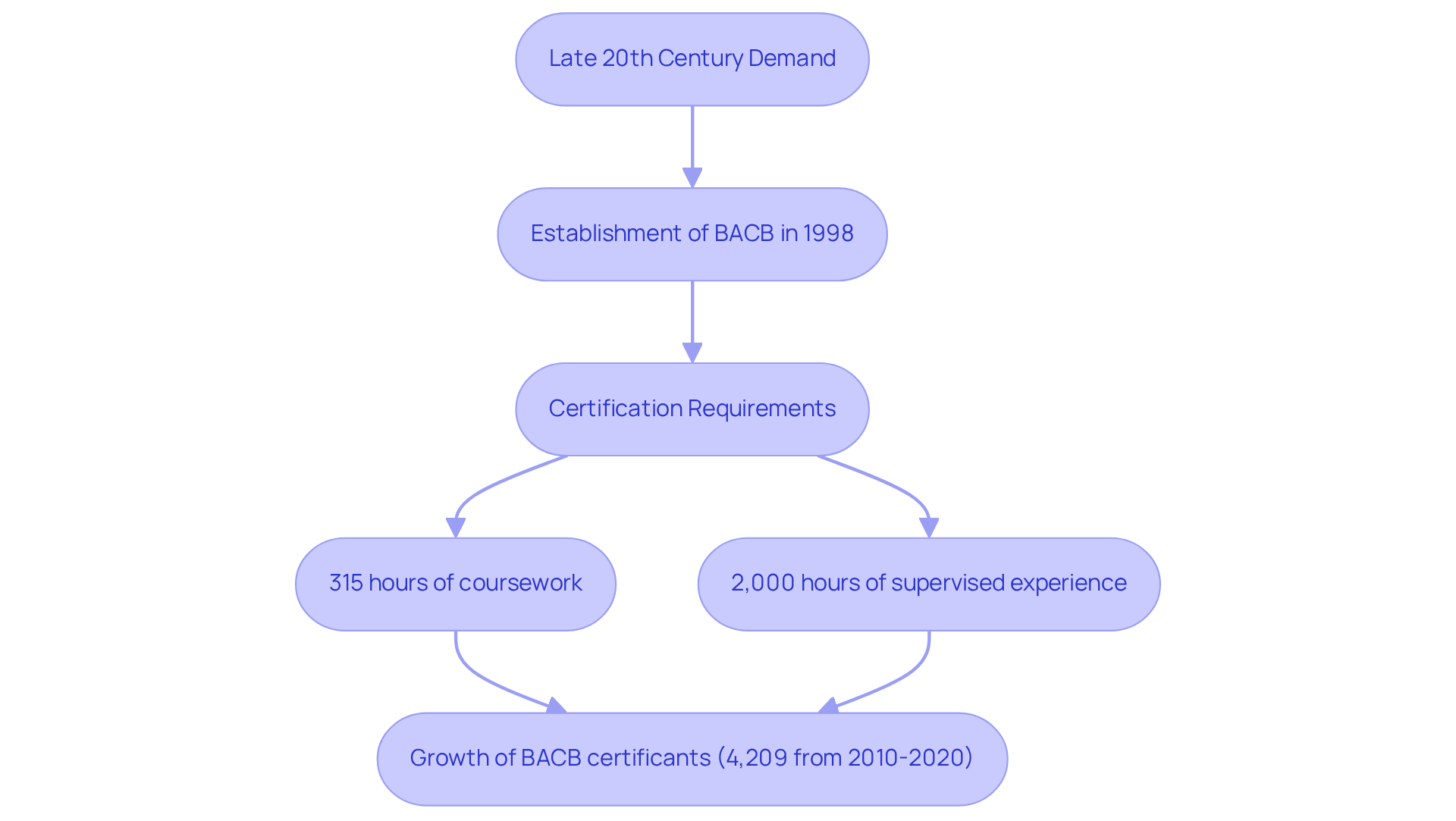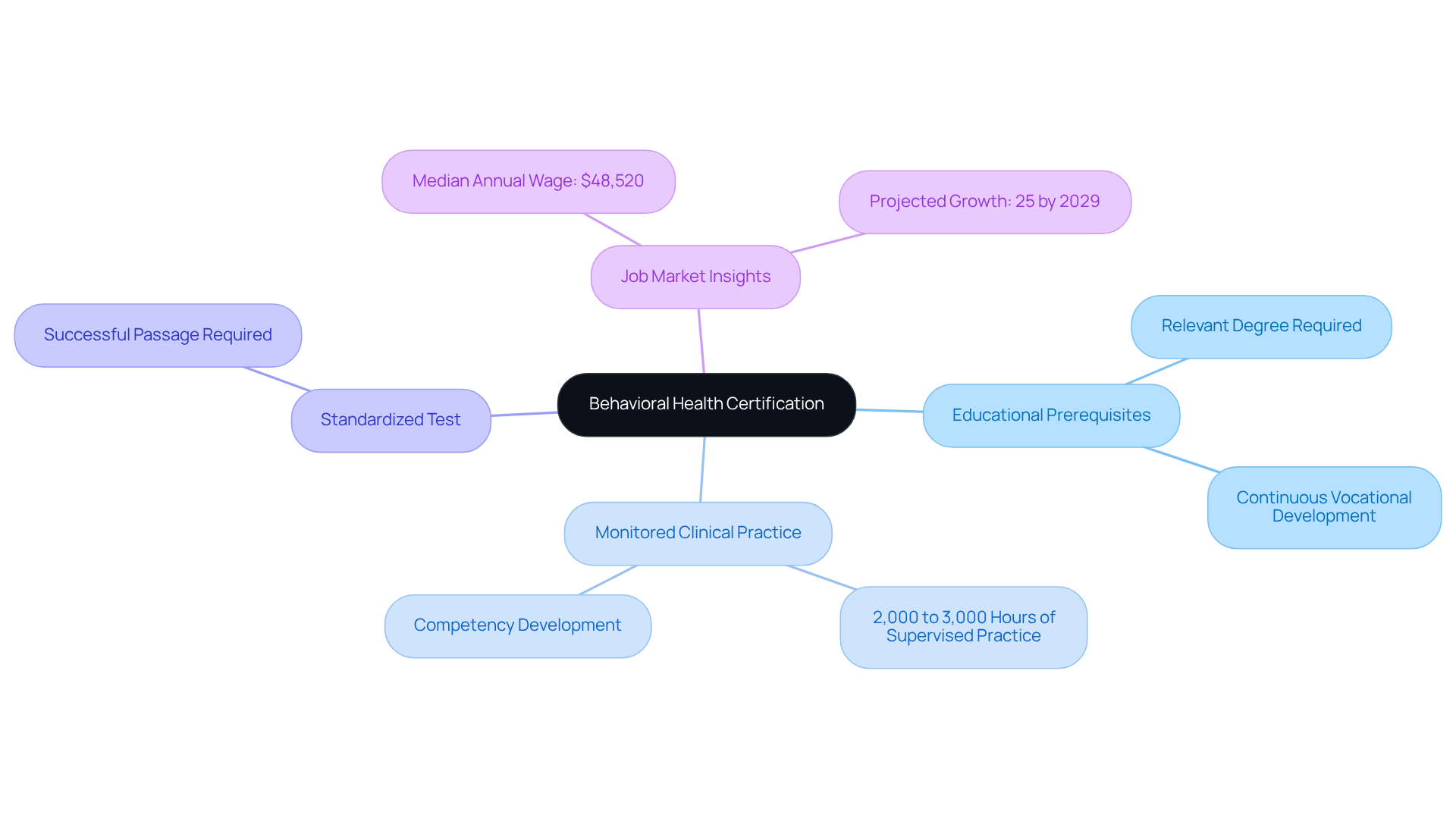June 30, 2025

The article explores the origins and benefits of behavioral health certification, underscoring its critical role in ensuring that qualified professionals serve in the mental wellness field. This certification not only enhances credibility but also significantly improves patient outcomes. As the demand for certified practitioners continues to rise, certification establishes a standard for quality care, fostering trust among clients. In an era where the need for competent professionals is paramount, understanding the value of certification becomes essential.
Behavioral health certification represents a crucial foundation in the mental wellness landscape, ensuring professionals possess the essential skills and knowledge to deliver effective care. With a projected increase of 25% in demand for Board Certified Behavior Analysts by 2026, the importance of obtaining this certification is undeniable.
What challenges do organizations encounter when hiring certified professionals? How can accreditation transform their recruitment strategies?
Delving into the origins, benefits, and pivotal role of behavioral health certification not only highlights its influence on individual careers but also underscores its significant impact on the quality of care provided to clients.
Behavioral health certification represents an essential recognition granted to professionals who have fulfilled specific educational and experiential criteria in the mental wellness domain. Esteemed organizations such as the Behavior Analyst Certification Board (BACB) and the National Certification Board for Behavioral Health Professionals (NCBBHP) typically confer the behavioral health certification designation. It serves as a testament to an individual's expertise in delivering effective mental wellness services, including assessment, treatment, and support for those confronting psychological and substance use disorders.
The is profound; it not only bolsters the credibility of practitioners but also instills confidence in clients regarding the quality of care they can expect. Currently, approximately 30% of individuals in the behavioral wellness sector possess a behavioral health certification, which reflects a growing recognition of the necessity for formal credentials to enhance service delivery and client outcomes. As the demand for skilled professionals escalates, particularly with the projected 25% increase in the need for Board Certified Behavior Analysts (BCBAs) by 2026, the relevance of behavioral health certification becomes increasingly critical in equipping practitioners to navigate the evolving landscape of mental wellness.
Are you facing challenges in hiring qualified professionals? Consider how obtaining a behavioral health certification can transform your recruitment strategy. By prioritizing certified individuals, you not only ensure high-quality service but also align with the industry's best practices, ultimately benefiting your organization and the clients you serve.

In the healthcare environment, having a behavioral health certification is essential, as it establishes strict standards that ensure individuals are well-prepared to meet the diverse needs of clients. With the demand for qualified practitioners projected to increase by 25% for Board Certified Behavior Analysts (BCBAs) over the next five years, serves as a crucial benchmark for quality assurance. It enhances the status of individuals and fosters trust among clients and stakeholders.
Research indicates that those who hold a behavioral health certification are more likely to adhere to best practices and ethical guidelines, which directly correlates with improved patient outcomes. Consider this: healthcare systems prioritizing accredited mental wellness experts often report higher satisfaction rates among clients. This reflects the positive influence of accreditation on the overall quality of care.
Moreover, personalized resume assessments offered by Hire ABA can help BCBAs optimize their job matching process. This ensures they are well-positioned to seize new opportunities in leadership roles and flexible working conditions. Are you facing challenges in hiring qualified professionals? This highlights the importance of accreditation in advancing effective and responsible wellness services, ultimately benefiting both practitioners and the communities they serve.
Take action today—consider how Hire ABA can enhance your recruitment process and ensure you have the best talent to meet your clients' needs.

The roots of mental wellness accreditation can be traced back to the late 20th century, a time marked by an increasing demand for standardized qualifications in psychological professions. A pivotal moment occurred with the establishment of the Behavior Analyst Certification Board (BACB) in 1998, which created a structured framework for certifying behavior analysts and ensuring a consistent level of competency across the field. This initiative was driven by the recognition that specialized training is essential for efficient service provision in mental wellness.
As the field evolved, various organizations emerged to offer behavioral health certification tailored for specific sectors within behavioral well-being, such as substance use counseling and mental wellness support. This diversification reflects a broader understanding of the complexities inherent in mental wellness services and the necessity for accountability among practitioners. For example, the BACB's rigorous qualification process mandates that candidates complete:
thereby reinforcing the importance of ethical standards and professional conduct.
Case studies from the late 20th century illustrate the gradual shift towards structured credentialing procedures, highlighting how these changes have shaped the field of mental wellness. The creation of the BACB not only set a benchmark for other accrediting organizations but also underscored the critical role that credentialing plays in enhancing the quality of care provided to individuals in need. Notably, from 2010 to 2020, the BACB witnessed an extraordinary growth of 4,209% in certificants, reflecting the surging demand for behavior analysts. Today, has become an indispensable aspect of occupational practice in mental wellness, ensuring that practitioners possess the essential skills and knowledge required to deliver effective interventions.

The demand for professionals with a behavioral health certification in the field of behavioral wellness is on the rise, underscoring the importance of rigorous accreditation standards. Key features of behavioral health certification include:
Candidates typically must hold a relevant degree in psychology, social work, or a related field, along with a specified number of hours in supervised practice, which often ranges from 2,000 to 3,000 hours. This extensive supervised clinical experience is crucial for developing the competencies needed in the field.
Moreover, continuous vocational development is often necessary to maintain behavioral health certification, ensuring that practitioners stay current with changing practices and standards. As reported by the Bureau of Labor Statistics, the median yearly wage for mental wellness counselors was $48,520 in 2021. This statistic not only highlights the increasing need for experts with behavioral health certification in this area but also points to an by 2029.
These traits not only enhance the credibility of professionals with behavioral health certification but also contribute significantly to the overall quality of care provided to clients in the mental wellness field. As you consider your hiring strategies, reflect on how the accreditation of your candidates can elevate the standards of care in your practice.

The demand for Board Certified Behavior Analysts (BCBAs) is soaring, making the advantages of acquiring both extensive and impactful. For practitioners, obtaining credentials significantly enhances job opportunities and earning potential; individuals with such qualifications earn, on average, 44% more than their non-certified counterparts. This financial incentive is complemented by the occupational identity and pride that certification fosters, reflecting a commitment to excellence in practice.
At Hire ABA, we simplify the job matching process for BCBAs through advanced job fit scoring and personalized guidance. We ensure that certified individuals are connected with roles that align with their expertise, goals, and work-life balance. For organizations, employing certified staff translates to improved service quality and enhanced patient outcomes. Certified professionals are trained to adhere to best practices and ethical standards, which can lead to higher client satisfaction and retention rates.
Moreover, organizations that prioritize accreditation can bolster their reputation and credibility within the community, making them more appealing to potential clients and funding sources. Are you facing challenges in hiring qualified professionals? Let Hire ABA guide you in making strategic hiring decisions. Overall, pursuing certification is a strategic investment for both individuals and organizations in the behavioral health sector, fostering a culture of excellence and accountability.
Behavioral health certification is a pivotal credential in the mental wellness field, affirming the expertise and qualifications of professionals dedicated to delivering effective care. This certification not only enhances the credibility of practitioners but also instills trust among clients, ensuring they receive high-quality support tailored to their needs.
Key points explored throughout the article include:
The historical context highlights the evolution of certification standards, reflecting a growing recognition of the need for qualified professionals in mental health. Furthermore, certification leads to improved patient outcomes, greater job opportunities, and enhanced earning potential for certified individuals.
In an environment where the demand for skilled behavioral health professionals is on the rise, pursuing certification is not merely a personal achievement but a strategic imperative for enhancing service quality in mental wellness. Organizations must prioritize hiring certified practitioners to foster a culture of excellence and accountability, ultimately benefiting the communities they serve. Embracing behavioral health certification is a proactive step towards ensuring the highest standards of care in an ever-evolving field.
What is behavioral health certification?
Behavioral health certification is a recognition granted to professionals who meet specific educational and experiential criteria in the mental wellness field. It signifies expertise in providing mental wellness services, including assessment, treatment, and support for psychological and substance use disorders.
Which organizations confer behavioral health certification?
Esteemed organizations such as the Behavior Analyst Certification Board (BACB) and the National Certification Board for Behavioral Health Professionals (NCBBHP) typically confer behavioral health certification.
Why is behavioral health certification important?
Behavioral health certification enhances the credibility of practitioners and instills confidence in clients regarding the quality of care they can expect. It also reflects a growing recognition of the need for formal credentials in the behavioral wellness sector.
What percentage of individuals in the behavioral wellness sector hold a behavioral health certification?
Approximately 30% of individuals in the behavioral wellness sector possess a behavioral health certification.
What is the projected demand for Board Certified Behavior Analysts (BCBAs) by 2026?
The demand for Board Certified Behavior Analysts (BCBAs) is projected to increase by 25% by 2026.
How does behavioral health certification affect patient outcomes?
Research indicates that professionals holding a behavioral health certification are more likely to adhere to best practices and ethical guidelines, which correlates with improved patient outcomes and higher client satisfaction rates.
How can behavioral health certification benefit hiring practices?
Prioritizing certified individuals in hiring ensures high-quality service and aligns with industry best practices, ultimately benefiting organizations and the clients they serve.
What resources are available for BCBAs to enhance their job matching process?
Personalized resume assessments offered by Hire ABA can help BCBAs optimize their job matching process, positioning them for new opportunities in leadership roles and flexible working conditions.
Our expert recruitment strategies and AI-driven sourcing ensure that you receive top-notch candidates quickly, without compromising on quality. Whether you’re looking for BCBAs, Clinical Directors, or RBTs, we’ve got you covered.